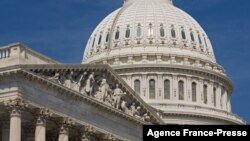The threat of a U.S. federal government shutdown loomed larger Wednesday as lawmakers failed to reach a budget agreement with two days to go before the funding runs out.
Congress has until Friday night to come up with a new budget in order to avoid a sudden stoppage of most so-called non-essential federal government operations, putting hundreds of thousands of workers on furlough without pay.
Various administrative offices, national parks, museums and dozens of other services would see their congressional authorization to spend money stop at the end of Friday.
During the winter 2018-2019 shutdown, which was the longest in U.S. history, about five weeks, security lines at airports were even affected.
Despite deep partisan divisions, the majority of both Republican and Democratic lawmakers hope to avoid a repeat of that scenario, which could wreak havoc ahead of the holidays.
But a handful of Republicans, many of whom are supporters of former president Donald Trump, are refusing to agree to the budget because they say it would contribute to the imposition of vaccine mandates ordered by President Joe Biden.
In a statement Wednesday, the House Freedom Caucus asked their Senate colleagues to "use all procedural tools at your disposal to deny timely passage" of any budget agreement that funds vaccine mandates or their enforcement.
Several Democrats expressed their frustration at the partisan stalemate, especially as the first case of the omicron coronavirus variant was confirmed in the United States.
Congressional budget agreements have often been made at the last minute in recent years, but as concerns grow that lawmakers may miss the deadline, economists have warned of the potential consequences of a looming shutdown.
A week of shutdown would cost the U.S. economy about $6 billion, according to a report by the Oxford Economics group.
